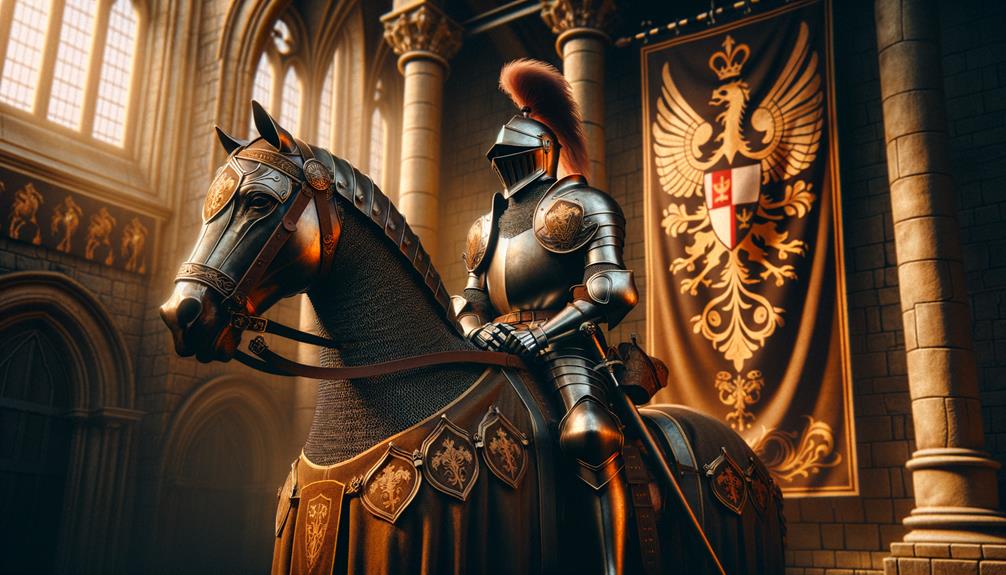Roland was a knight of great renown, celebrated for his daring exploits under Charlemagne's rule. The tales of his unwavering faithfulness are as famous as the legends of his mythical sword, Durandal. With Charlemagne's innovative leadership and astute combat strategies, Roland's courageous acts helped shape what it meant to be a knight in Charlemagne's vast empire.
One of the most poignant stories is of Roland's brave final stand at the Battle of Roncevaux Pass. Although he met a tragic end, his story echoes through the annals of European folklore. Roland has become a symbol of courage, loyalty, and the embodiment of knightly values. His tale continues to influence many, teaching powerful lessons about heroism and self-sacrifice.
The legacy of Roland and his lasting influence on medieval chivalry is a narrative that deserves further exploration. After all, there's always more to learn about this iconic figure and the impact he had on history.
The Life of Roland
Let's take a moment to appreciate the extraordinary life of Roland. This man wasn't just a Frankish military leader; he was a legend. His courage and bravery were so extraordinary that even his uncle, the great Emperor Charlemagne, praised him. His place among Charlemagne's top twelve warriors speaks volumes about his strength and skill in battle.
You've probably heard about Roland's famous Last Stand at the Battle of Roncevaux Pass. This particular event is a testament to his exceptional courage. Despite being fatally wounded, Roland managed to avenge his father's death, shatter the will of the Saracen warriors, and lead his men to a triumphant victory.
And who could forget his legendary sword, Durandal? Its story, along with Roland's courageous death at Roncevaux Pass, is beautifully told in the Song of Roland. This medieval tale masterfully captures Roland's bravery and heroism, making sure they'll never be forgotten.
Charlemagnes Influence
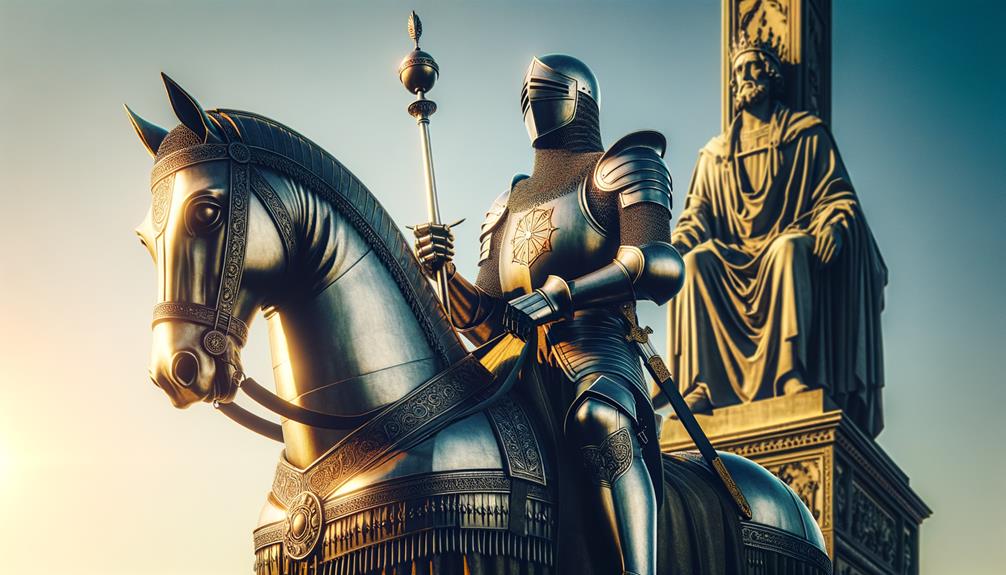
Alright, let's chat about the immense influence of Charlemagne – it's as large as the empire he ruled. His unique leadership methods, inventive battle tactics, and pioneering changes in culture and education didn't just shape his time, but they continue to resonate throughout history. By digging into these aspects, we can understand why Charlemagne has left such a lasting mark on the fabric of contemporary Europe.
Charlemagnes Leadership Style
Let's chat about Charlemagne, the legendary leader whose reign was characterized by a unique mix of unity and growth. He was always on the move, keen on expanding his empire through well-thought-out military campaigns. These strategic moves clearly highlight his leadership finesse.
Charlemagne was also known for his effective administrative style, which was marked by centralization and a series of reforms. He made significant changes in the areas of law, education, and religion, all with the aim of creating a more unified empire.
Here's a simple breakdown of the key aspects of Charlemagne's leadership:
| Leadership Style | How He Did It | The Result |
|---|---|---|
| Unity and Growth | Military Campaigns & Strategic Moves | An Expanded Empire |
| Centralization | Administrative & Legal Reforms | A Stronger Rule |
| Reforms | Changes in Education & Religion | A More Unified Empire |
Charlemagne's leadership style had a profound impact on medieval Europe, so much so that he's often referred to as the 'Father of Europe'.
Military Tactics and Strategies
Taking a closer look at Charlemagne's military skills, one can't help but admire the extraordinary strategist who brought about significant changes in warfare. His emphasis on heavy cavalry, infantry, and meticulously planned sieges was nothing short of revolutionary. Charlemagne was known for his innovative and ruthless military tactics, often relying on quick and unexpected maneuvers to catch his enemies off balance. His preferred methods were surprise tactics, such as unexpected dawn attacks or cleverly planned ambushes.
Charlemagne's decision to adopt feudalism was a strategic move that allowed him to raise large armies and maintain control over extensive territories. He ensured the defense of his empire by fortifying its borders with garrisons. His clever alliances with neighboring kingdoms and diplomatic missions played a crucial role in his military triumphs. Charlemagne's impact on warfare was significant, with his tactics shaping the future of military strategies.
Cultural and Educational Reforms
Let's turn the spotlight onto Charlemagne's remarkable contribution to culture and education, setting aside his military achievements for a moment. His innovative educational initiatives, such as setting up a palace school, were truly unique for their time. He welcomed thinkers and scholars to his court, fostering an environment that was ripe for intellectual growth. He encouraged the study of subjects like Latin, grammar, rhetoric, and logic.
This deep dedication to knowledge wasn't limited to education alone; it also spilled over into his cultural initiatives. Charlemagne took significant steps towards preserving and promoting classical literature, sparking what we now refer to as the Carolingian Renaissance. This era was characterized by a surge in the production of manuscripts, which rejuvenated interest in the Chanson de Roland and other classical masterpieces. In essence, Charlemagne's cultural and educational reforms provided the groundwork for a surge in intellectual and cultural activity in Europe.
Battle of Roncevaux Pass
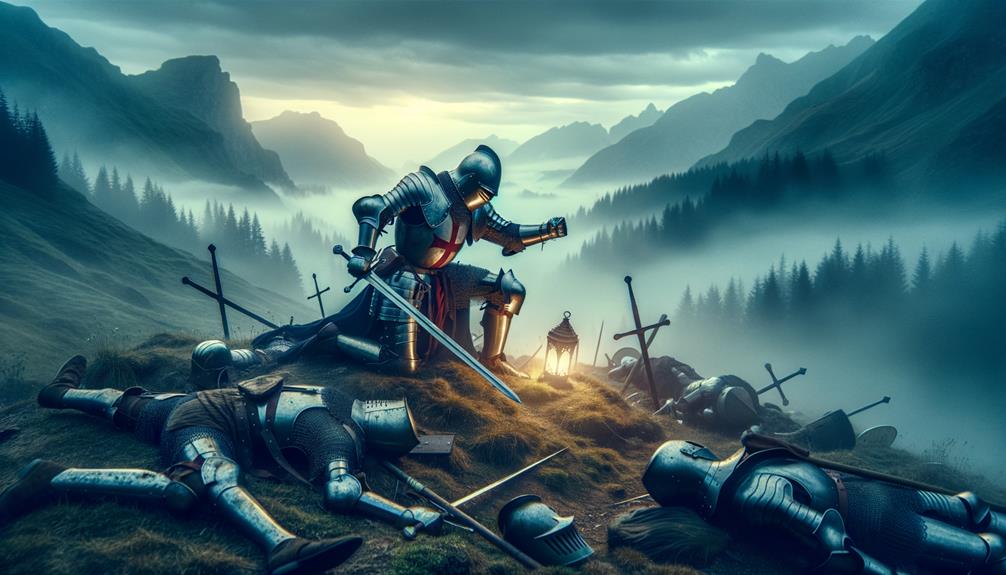
Back in the 800s, a crucial clash broke out at a place called Roncevaux Pass. At the heart of this battle was Roland, the brave nephew of the famous Charlemagne. Roland, despite having the odds stacked against him and dealing with deceit from his own team, took a stand against the intimidating Saracen and Basque warriors. He found himself and his men facing a ruthless surprise attack, a result of Ganelon's betrayal.
Even with these odds, Roland was no ordinary soldier. He fought valiantly with his renowned sword Durandal, causing significant damage to enemy forces. But, his bravery had a heartbreaking outcome; Roland tragically lost his life in the Battle of Roncevaux Pass. Yet, his fearlessness managed to inspire those who lived on.
After the battle, Charlemagne was not one to sit back. He took revenge, seized Saragossa, and dealt with the deceitful Marsile. All these actions only served to strengthen the memory of Roland, solidifying his position as a timeless hero.
Rolands Heroic Deeds
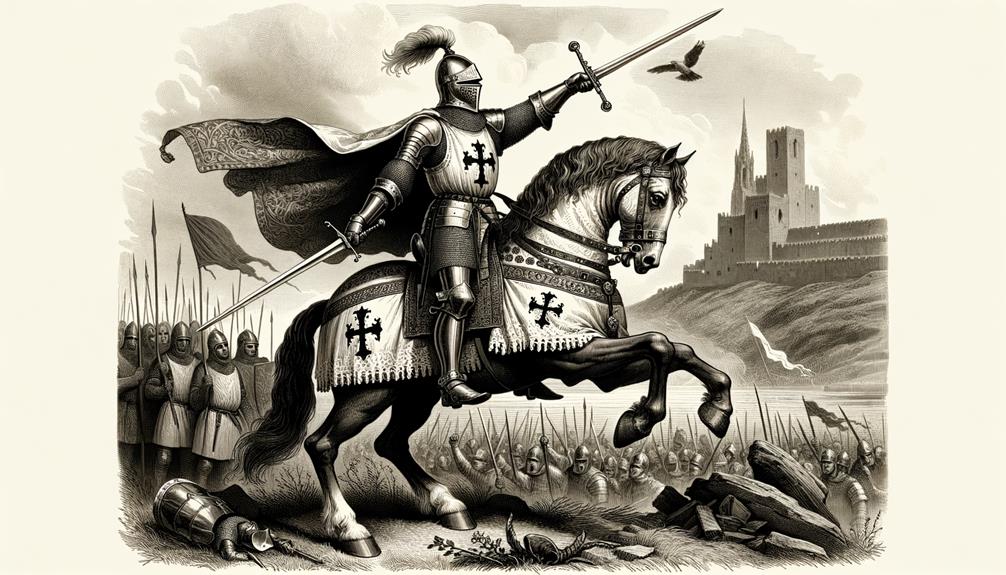
Let's dive into the unforgettable heroics of Roland, a tale that has been passed down through the ages of medieval Europe. His courage and unwavering loyalty are legendary. His spectacular display of bravery during his final stand at the Battle of Roncevaux Pass is particularly noteworthy. Even while mortally injured, he led his troops to a triumphant victory, utterly demoralizing the Saracen combatants. His bravery was as famous as his sword, Durandal. In an effort to keep it from enemy hands, he even tried to destroy this symbol of his legacy.
Let's look at the significance of his deeds:
| Deed | Significance |
|---|---|
| Avenging his father's death | Proof of personal bravery and loyalty |
| Last stand at Roncevaux | A testament to his heroism and courage |
| Attempted to destroy Durandal | Indication of his commitment to protect his legacy |
Each of these moments of Roland's bravery adds to the grand narrative of this medieval knight, reinforcing his image as a symbol of courage and loyalty. It's fascinating to reflect on these tales of bravery and valor, which continue to inspire us today.
Influence on Medieval Chivalry
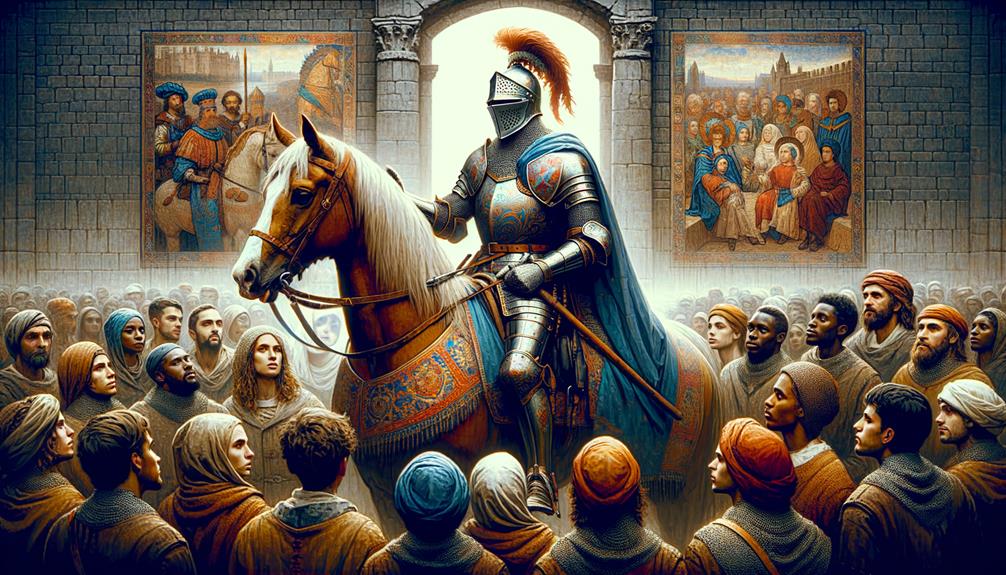
When you delve into the story of Roland, it's clear that his extraordinary courage and steadfast loyalty to Charlemagne embodied the chivalric code of honor and bravery during medieval times. More than that, his story laid the foundation for the principles of knighthood and bravery. His heroic deeds were a source of inspiration in medieval literature, shaping the concepts of sacrifice and loyalty.
- Roland's brave deeds at Roncevaux Pass became the gold standard for knightly virtues.
- His readiness to give up his life highlighted the true spirit of chivalry.
- The legendary stories of Roland played a significant role in shaping the knightly ideals throughout medieval Europe.
To sum it up, Roland's life was the ultimate representation of medieval chivalry, and his influence has echoed through the ages.
Rolands Legacy and Depictions
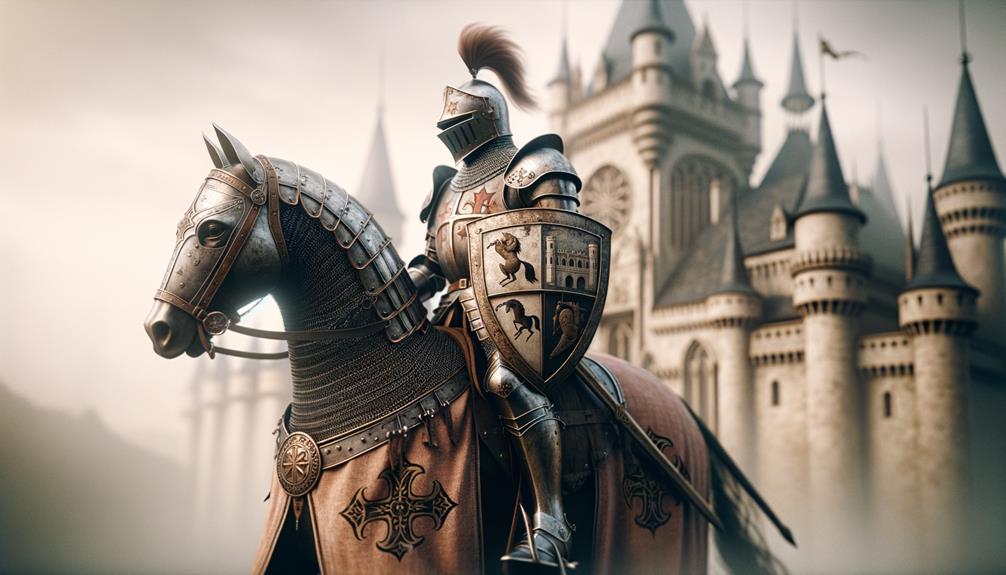
If you're a fan of medieval literature, you're in for a treat! The story of Roland is filled with high-stakes adventures, gallant heroics, and classic knightly virtues. Roland, who has become a legendary figure, showed real guts in the Battle of Roncevaux Pass, a moment that has made him a permanent fixture in European folklore.
His bravery and loyalty were so exceptional, they set a new standard for what it meant to be a knight. Roland's death, while heartbreaking, was also undeniably heroic, and has been referenced in countless works of art and literature. This has greatly impacted how we view medieval knights in these mediums. So, Roland's story continues to be passed down, generation after generation, and it still speaks to us on a deep level. His story helps us understand what it truly means to be a hero and to make the ultimate sacrifice.
Simply put, Roland's legacy is alive and well. We see it in the stories and poems that celebrate his life and the values he stood for.
Frequently Asked Questions
Was Roland a Good Knight?
Oh, you bet! When it comes to Roland, he's definitely one for the books – a knight who was nothing short of exceptional. His boldness and faithfulness are things of legend, and his epic exploits are widely celebrated. The guy was a pro in battle, a leader who knew how to command, and his wielding of Durandal was nothing short of impressive. Rewind to his heroic stand at Roncevaux Pass, and you'll see a man who was all about commitment and integrity. A knight? Absolutely. But Roland was more than that – he was a symbol of what it truly means to be valiant and honorable.
What Was Roland Known For?
People know me as a brave and strong warrior, with my most memorable feat being the Battle of Roncevaux Pass. Even though I was severely wounded, I didn't back down and led my men to a triumphant victory. I guess you could say I embodied what it means to be a true knight right till my final breath.
Who Is Roland Based On?
You know, it's kind of tricky to pin down who exactly Roland is based on. This fellow is a legendary character plucked straight from medieval myths and stories, probably drawing inspiration from different heroes of that era. His tale weaves together threads of both fact and fiction, making it somewhat of a challenge to trace back to a single source.
What Is the Story of Sir Roland?
From my perspective, the story of Sir Roland is a real doozy. He's the nephew of Charlemagne and considered a hero from the medieval times. His claim to fame? His final courageous battle at Roncevaux Pass, where he fought valiantly even though he knew he was fatally injured. Talk about guts and glory!

